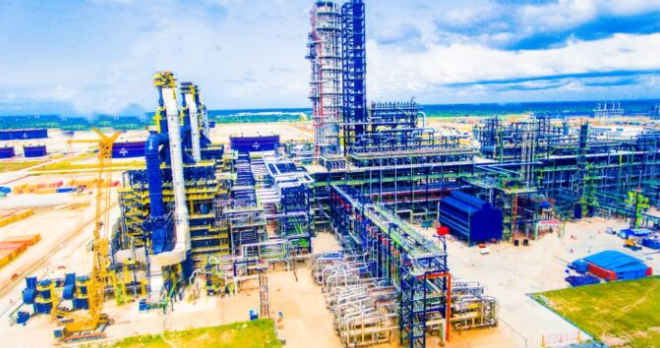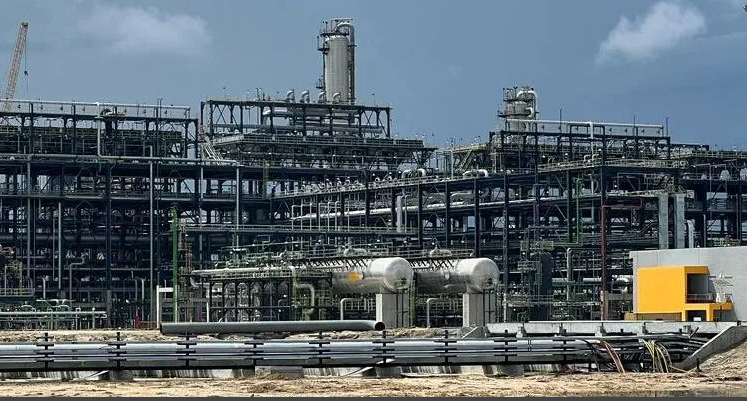Connect with us
Published
4 months agoon
By
dplanatenews
Nigeria, Africa’s largest crude oil producer, is once again facing the threat of a nationwide fuel crisis as tensions escalate between Dangote Refinery and the Petroleum and Natural Gas Senior Staff Association of Nigeria (PENGASSAN). Analysts warn that the standoff could result in an estimated ₦14.7 billion daily loss, further destabilizing an already fragile economy and putting enormous pressure on citizens grappling with rising inflation and unemployment.
The refinery, heralded as a beacon of hope for Nigeria’s energy independence, is now at the center of a labor dispute that risks undermining its potential. If not urgently addressed, the rift could plunge the nation back into chronic fuel scarcity, skyrocketing pump prices, and economic disruptions across multiple sectors.

The Dangote Refinery, valued at over $20 billion, is Africa’s largest single-train refinery, with a processing capacity of 650,000 barrels per day. Commissioned in 2023, it was seen as a turning point for Nigeria’s decades-long dependence on imported refined petroleum products.
For decades, Nigeria has exported crude oil only to spend billions importing refined petrol, diesel, and kerosene due to the collapse of state-owned refineries in Port Harcourt, Warri, and Kaduna. The Dangote Refinery was designed to end this paradox, generate thousands of jobs, and save the country billions in foreign exchange.
However, the current conflict with PENGASSAN threatens to derail these ambitions.
The rift between Dangote Refinery management and PENGASSAN is reportedly fueled by disagreements over labor relations, employee rights, and unionization. Some of the key sticking points include:
The standoff has escalated to the point where PENGASSAN has threatened strike actions, which could severely affect production and distribution of fuel products nationwide.

Economic experts warn that the dispute could cost Nigeria up to ₦14.7 billion per day in lost revenue and productivity. This staggering figure reflects:
Given that the refinery was expected to save the country nearly $25 billion annually in foreign exchange, any disruption represents a significant setback.
Nigerians are beginning to feel the ripple effects of the rift. Reports of long queues at petrol stations in Lagos, Abuja, and Port Harcourt suggest a looming supply crunch. If unresolved, the crisis could lead to:
For ordinary Nigerians already struggling with high living costs, the situation could trigger another round of economic hardship.
The Federal Government, through the Ministry of Labour and the Ministry of Petroleum Resources, has expressed concern about the brewing crisis. Several options are being considered to avert a full-blown shutdown:
Without swift intervention, the standoff could escalate into a nationwide strike affecting not just Dangote Refinery but the broader oil and gas industry.
The Dangote Refinery is not only vital for Nigeria but also for the West African subregion. Neighboring countries like Ghana, Benin, and Togo had been counting on Nigeria’s refinery to meet their petroleum product needs. Disruptions could force these countries to seek alternative suppliers, altering regional trade dynamics.
On a global scale, investors are closely watching the crisis. Nigeria’s ability to manage it successfully could bolster investor confidence, while failure may cement perceptions of Nigeria as a high-risk investment environment.
This conflict represents more than a labor dispute—it is a defining moment for Nigeria’s energy sector. The stakes include:
Failure to resolve the rift could jeopardize Nigeria’s long-term economic aspirations.
To avert further escalation, stakeholders must prioritize solutions:
The deepening rift between Dangote Refinery and PENGASSAN poses a serious threat to Nigeria’s economy, with potential daily losses of ₦14.7 billion and the looming risk of a fuel crisis.
Nigeria cannot afford prolonged fuel scarcity at a time of rising inflation and economic uncertainty. Swift action is needed to strike a balance between protecting workers’ rights and safeguarding national energy security.
The outcome of this dispute will determine whether the Dangote Refinery fulfills its promise as a game-changer for Nigeria—or becomes yet another symbol of missed opportunities in the nation’s troubled oil and gas sector.
